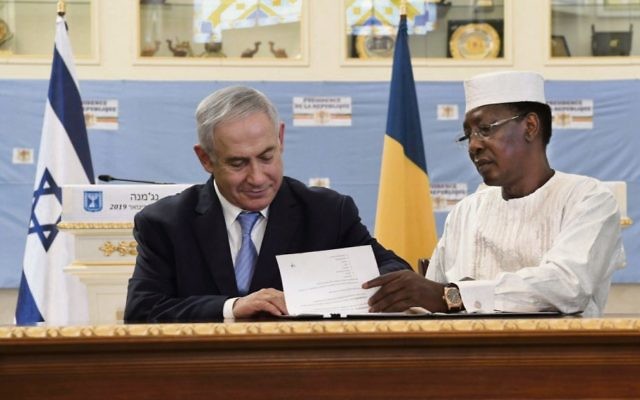Israel’s diplomatic inroads in Africa
Israel scored a triple diplomatic triumph in the Muslim world this week, as Benjamin Netanyahu went to restore relations with Chad, and chalked up two more successes over the next day.

ISRAEL scored a triple diplomatic triumph in the Muslim world this week, as Benjamin Netanyahu went to restore relations with Chad, and chalked up two more successes over the next day.
His plane flew over South Sudan. Despite being independent, its airspace is controlled by Sudan, a Muslim country that was, until three years ago, seen as Iran’s lapdog.
There is now speculation that the rerouting of Netanyahu’s plane could indicate that Sudan is mulling a radical rethink on its attitude towards Israel.
Aviation breakthroughs are seen as very important in Jerusalem. When Saudi Arabia allowed Israel-bound planes to fly through its airspace in May, it was viewed as a strong signal Riyadh is softening its stance on Israel.
Just after Netanyahu returned to Israel, it emerged that he will soon host the PM of another Muslim African country, Mali. Soumeylou Boubèye Maïga is expected to visit in the next few weeks, despite the fact that, like Chad, his country cut ties with Israel in the ’70s.
Netanyahu’s first success this week involved red-carpet treatment in Chad, where President Idriss Deby, who recently visited Jerusalem, welcomed him as if he was an old friend. They went through the formal processes to reinstate diplomatic relations.
“Israel can now say, ‘some of our best friends are Muslims,'” Moshe Maoz, an expert on Israel’s relationship with Islamic countries, told The AJN.
The Hebrew University professor explained that while Chad isn’t a particularly powerful Muslim state, its move could set a precedent for other countries, and help to break the taboo that still exists regarding relations with Israel.
This week’s developments with Muslim countries come on the heels of a Netanyahu trip to Oman, and a trip by his colleague Miri Regev to the United Arab Emirates. Netanyahu spoke at length in Chad about opportunities for Israel to expand its relationships.
These shifts are starting to happen because African countries are reaching the conclusion that Israel has more to offer them than Arab states, Jonathan Rynhold, analyst on Israel’s foreign policy, told The AJN.
“The Palestinian issue is no longer a block on development of relationships with Third World and Muslim states, which it was since the Yom Kippur war,” he said. “The politics have changed dramatically.”
Rynhold, deputy head of the political studies department at Bar-Ilan University, said that Muslim countries in Africa think they stand to gain from Israeli technology and trade with Jerusalem, while the Arab world is divided and weak.
“Iran and Hamas and the Palestinian Authority can scream and shout, but they don’t have what these countries want, and they don’t have capability to harm them if they connect with Israel,” he commented.
Netanyahu made efforts during his time in Chad to not only convince people that Israel and Muslim states are compatible – he tried to illustrate that there is cultural common ground.
“I learned today about the fate of African fighters, soldiers, in World War II, prisoners of war who were murdered by the Nazis, specifically because they were black,” Netanyahu said. “This is a story that has to be told. You suffered because you were black; we suffered because we were Jews.
“We refuse to accept this fate and we raised ourselves from defeat to create a new future for ourselves and for each other.”
But the main message from Netanyahu this week was that other countries can and should follow Chad’s lead.
“It’s significant for us that Chad is a country with a Muslim majority that seeks the friendship of Israel,” Netanyahu said, standing alongside Deby.
Earlier, he billed his trip as “part of the revolution that we are doing in the Arab and Islamic worlds”, and promised that other countries will follow Chad.
He pointed out that Israel’s breakthroughs with Muslim countries “cause outrage in Iran and among the Palestinians who are trying to prevent this”. They “will not succeed”, he said, expressing hope that mending relations with Chad will help break the taboo on Muslim countries accepting Israel.
Maoz said that the push to connect Israel to Africa isn’t new, but success has been limited until now.
“Back in the ’50s, Ben-Gurion wanted to reach out to African countries. What we are seeing now is a more extensive and better version of this push.”
NATHAN JEFFAY

comments